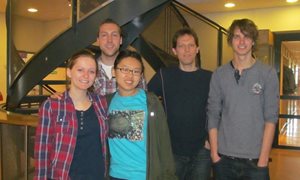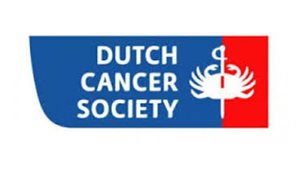8 November 2018
This year four projects were awarded:
 Four TURBO grants were awarded to new technical-medical research proposals. The grants are part of the TURBO program, a collaboration between Radboudumc and the University of Twente. With these grants, research groups from both institutions can further develop an innovative idea with the intent of subsequently submitting it to an external grant provider. The TURBO program is now in its second year.
Four TURBO grants were awarded to new technical-medical research proposals. The grants are part of the TURBO program, a collaboration between Radboudumc and the University of Twente. With these grants, research groups from both institutions can further develop an innovative idea with the intent of subsequently submitting it to an external grant provider. The TURBO program is now in its second year.
This year four projects were awarded:
Tumor-on-a-chip
Hypoxia (oxygen deficiency) in a tumor increases the aggressiveness and hinders the effectiveness of immunotherapy. Currently, no therapy exists that specifically targets hypoxic cells in tumors. Roland Brock, theme Nanomedicine and Severine Le Gac (UT) will be developing a smart tumor-on-a-chip that can mimic these complex tumor structures in order to study possible ways to specifically kill hypoxic cancer cells.A 3D brain tumor environment
At this moment, it is not yet possible to simulate the brain structure in 3D with organ-on-a-chip technology. As a result, the knowledge about the interaction between glioma cells (a type of tumor) and surrounding brain cells is still rudimentary. Peter Friedl, theme Cancer development and immune defense, and Jai Prakash (UT) want to develop a 3D brain tumor micro-environment in order to study this interaction and take further steps towards targeted treatments.Monitoring resilience with wearable sensors
People who break a hip often do not fully recover. This leads to a heavier disease burden for the patient and increases costs to society. The outcome of treatments would improve if doctors were better able to predict and quantify the individual resilience of patients. René Melis, theme Healthcare improvement science, and Hermie Hermens (UT) will be developing a system that uses wearable sensors and smart algorithms to measure this resilience and support treatment decisions.Improved breathing in neuromuscular disorders
Many neuromuscular disorders, such as ALS, can lead to complete or partial loss of diaphragm function. This makes it difficult for patients to breathe. While diaphragm pacemakers (similar to those used for the heart) do exist, their possibilities are still limited: they ensure even breathing, but do not adapt to changing needs, for example, when the patient is moving. This limits their applicability. Baziel van Engelen, theme Neuromuscular diseases and Peter Veltink (UT) will be working on the development of a new diaphragm pacemaker that responds to the needs of the individual patient and thus contributes to greater mobility and independence.Related news items

Miniaturized microfluidic platform for automated epigenetic profiling
6 May 2021 Together with Fluidigm, a US-based company focusing on microfluidics, the team of Hendrik Marks publishes in Genome Research the development of a powerful plug and play ChIP-seq platform for minute amount of cells, such as embryonic specimens or small biopsies. go to page
KWF Roadshow 11 November 2019
10 October 2019 In which way(s) can KWF provide optimal support to oncological research and care? How can we maximize impact on our investments? These questions are pivotal in Ambition 2030: the vision that KWF developed in close cooperation with stakeholders in the oncological field. go to page
Towards molecular therapies for Myotonic Dystrophy
1 October 2019ReCognitION, a new 1.3 M€ European project under the leadership of Peter-Bram ‘t Hoen, Baziel van Engelen and Jeffrey Glennon, was kicked-off in Gent.
go to page
Internal KWF review procedure 2020
13 June 2019 In agreement with the existing policy the research board and Radboud Center for Oncology have decided to continue with the mandatory internal review procedure for KWF grant applications. go to page
Save the date for Radboud New Frontiers 2018: Betere zorg, netwerkzorg?
17 January 2018 After standard care, standardized care, and personalized care, network care will be care 4.0. But how exactly do you do that? Should we create new structures for it or is it just a matter of trust and ability to step back? go to page